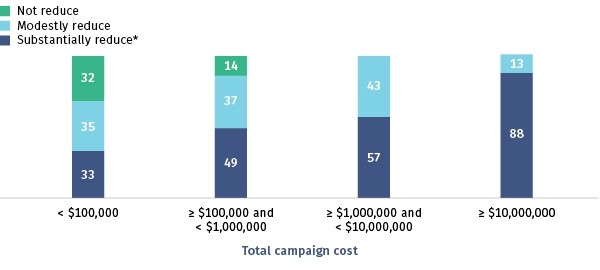ICI Viewpoints
Proxy Proposals Worth Supporting

The Securities and Exchange Commission (SEC) can save millions of dollars for registered fund shareholders, while maintaining investor protections, by reforming the fund proxy system. The system, which funds use to solicit votes from their shareholders, poses significant challenges and costs to funds and their investors, according to a new report by the Investment Company Institute (ICI).
Obtaining Shareholder Approval by Proxy Is Difficult and Expensive
Under the Investment Company Act of 1940, funds must get shareholder approval for “1940 Act majority items,” such as changing fundamental policies, adopting or revising advisory and distribution agreements, or merging funds within the same fund family. Funds need a quorum (i.e., minimum number of shareholders present) exceeding 50 percent to approve these items, but face several challenges in reaching quorum and obtaining shareholder approval:
- funds generally have large, diffuse, and retail-oriented shareholder bases, and retail investors are less likely to vote than institutional investors; and
- current rules limit funds’ abilities to directly contact shareholders.
Complicating matters further, printed proxy materials are dense, so many shareholders do not read them. If a sufficiently large number of shareholders do not respond promptly to this initial mailing (as is common), shareholders then receive repeated mailings, emails, and even dinnertime phone calls to secure their votes. This is costly and unwelcome by both funds and their shareholders, but current realities and the legal framework compel it.
ICI’s Evaluation of Proxy Campaigns
In 1992, the SEC’s Division of Investment Management stated that it was “difficult to estimate the magnitude of these [fund proxy] costs with any degree of accuracy….” No longer. ICI’s recent survey of funds’ proxy campaigns over the past seven years (2012 to 2019) included responses from 64 firms managing more than $18 trillion, or more than three-fourths of US-registered fund assets. The survey reveals that the challenges funds face in seeking shareholder approval can result in extremely expensive proxy campaigns—costs ultimately borne by funds and their investors.
Of the 145 campaigns for which respondents provided cost estimates:
- 22 cost $1 million or more;
- 8 cost $10 million or more;
- 3 cost more than $50 million; and
- the most expensive reported campaign cost $107 million.
The direct costs of those campaigns totaled more than $373 million. This figure understates overall industrywide costs because respondents provided information limited to five 1940 Act majority items and their related campaigns; excluded campaigns consisting only of non-1940 Act majority items (such as director elections); and didn’t report internal proxy costs, such as employees’ time spent on proxy campaigns instead of other functions.
We also learned that another fund family’s 2009 proxy campaign—outside our survey’s window—cost nearly $136 million.
Beyond these quantifiable costs, the report shows that the anticipated costs of the proxy process sometimes delay or deter funds from taking certain actions, such as adding board members, changing fundamental policies, or pursuing certain fund mergers.
“Supermajority Option” Would Substantially Reduce Proxy Campaign Costs
Fortunately, there are concrete regulatory actions that would improve the fund proxy system’s efficiency and cost-effectiveness for funds and their shareholders. For instance, ICI is asking the SEC to create an alternative method for funds to achieve a “majority vote” for 1940 Act majority items. Currently, funds typically achieve a majority vote with a greater than 50 percent quorum, and at least 67 percent of shares present voting in favor of a proposal.
ICI’s “supermajority” method couples a lower quorum threshold (more than 33⅓ percent) with a higher affirmative vote (at least 75 percent) to approve certain items. Only those items with exceedingly strong support from voting shareholders would pass. As an added protection, the proposal would need unanimous approval from the fund board.
ICI’s report shows that this approach would meaningfully reduce total costs for 1940 Act majority item proxy campaigns—particularly for costlier campaigns. The figure below illustrates that as campaign costs increase, the supermajority method increases savings for funds and their shareholders. For example, for proxy campaigns that cost $10 million or more, 88 percent of respondents said that the alternative supermajority method would substantially reduce their total proxy campaign costs.
Survey Participants with Costlier Campaigns Reported That ICI’s Supermajority Recommendation Will Substantially Reduce Their Total Proxy Campaign Costs
Percentage of campaigns

*Substantially reduce includes respondents that answered “substantially reduce” or “significantly reduce.
Note: As noted on page 11 of the report, some proxy campaigns are relatively low-cost because they may be of limited scope and/or the funds’ shareholder bases may have features that significantly reduce the need for follow-up solicitation.
More specifically, of the $373 million in reported proxy campaign costs, respondents estimated that their follow-up solicitation costs ranged from $229 million (or 61 percent of total costs) to $158 million (or 42 percent of total costs). The supermajority method would significantly reduce these follow-up costs.
Modifying Other Proxy Requirements Would Further Decrease Expenses
Other important reforms to pursue include the following:
- The SEC could consider alternatives to shareholder approval for certain 1940 Act majority items. For example, instead of requiring shareholder approval for all fundamental policy changes, the SEC could permit funds to make certain changes with board approval and advance notice to shareholders.
- Proxy disclosure is ripe for reform. The lengthy tabular presentations in multi-fund proxies increase costs and page counts while discouraging shareholder engagement—letting funds link to this information would be a simple fix.
- Revisions to requirements regarding proxy processing fees and shareholder communication (to permit funds to directly contact all of their shareholders in connection with proxy campaigns) would unlock significant savings and enhance funds’ engagement with their shareholders.
Our review of fund proxy campaigns clearly demonstrates that inertia is costly for fund shareholders. So too is regulatory inertia. The SEC is well-positioned to address many of the proxy-related problems for funds. The time to act is now.
For more information, please visit ICI’s Proxy Voting Resource Center.
Matt Thornton is an Associate General Counsel, Securities Regulation at ICI.
